
CORE COMMUNITY POLICING RESOURCES
Community policing is a philosophy that promotes organizational strategies, which support the systematic use of partnerships and problem-solving techniques, to proactively address the immediate conditions that give rise to public safety issues such as crime, social disorder, and fear of crime.
Community Policing is comprised of three key components:
Community Partnerships
Collaborative partnerships between law enforcement agencies and the individuals and organizations they serve increase trust in police and help to develop solutions to problems. These partnerships can include other government agencies, community members, nonprofits and service providers, private businesses, and media.
Organizational Transformation
Organizational transformation involves aligning organizational management, structure, personnel, and information systems to support community partnerships and proactive problem solving.
Problem Solving
Problem solving includes the process of engaging in proactive and systematic examination of identified problems to develop and rigorously evaluate effective responses. Rather than responding to crime only after it occurs, community policing encourages agencies to proactively develop solutions to the immediate underlying conditions contributing to public safety problems.
 |
COPS Collaboration Toolkit: How to Build,
Fix, and Sustain Productive Partnerships This toolkit provides practical guidance to law enforcement agencies as they develop and sustain partnerships that support community policing. The toolkit will benefit law enforcement personnel, community-based organizations, educators, youth, government officials, and others seeking to combine efforts to reduce crime and social disorder problems. |
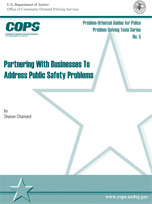 |
Partnering with Businesses to Address
Public Safety Problems For businesses in the United States, the annual cost of crime is in the billions of dollars. This guide reviews the impact of crime on business and the roles businesses play in contributing to crime. It presents and analyzes types of partnerships and strategies for forming them. It concludes with examples of businesspolice partnerships and programs, some that are known to be effective and others that are still largely untested. |
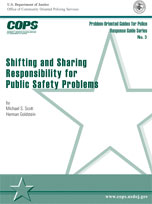 |
Shifting and Sharing Responsibility for Public Safety Problems Although the police effectively address many public safety problems with their authority and expertise, they have come to depend on others to aid them in addressing the conditions that underlie crime and disorder. With such help, the police can more effectively prevent and control such problems. This guide examines how the police can persuade private citizens, businesses, or the government to respond to common crime and disorder problems. |
![]()
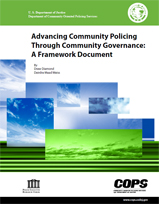 |
Advancing Community Policing Through Community Governance: A Framework Document As law enforcement agencies strengthen and advance their community policing efforts they often call on colleagues in other departments of their city government. Many city administrators and elected officials are also seeking ways to increase community involvement in local government matters more systematically. These efforts are part of a philosophical approach to local governance referred to as “community governance.” This publication details this philosophy and describes its implementation in five communities across the country. |
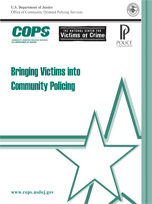 |
Bringing Victims Into Community Policing This publication focuses on the role of crime victims in advancing community policing. It includes first responder guides to dealing with victims, a "model" policy for the prevention of repeat victimization, and the benefits of developing relationships between the police, crime victims, and victim organizations. |
 |
Community Policing Defined This guide describes the elements and sub-elements that fall under the community policing philosophy. It covers the range of collaborative partnerships that exist between policing agencies and the individuals and organizations they serve; outlines the process of engaging in the proactive and systematic examination of identified problems to develop effective responses; and illustrates how to align organizational management, structure, personnel, and information systems to support community partnerships and proactive problem solving. |
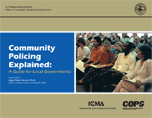 |
Community Policing Explained: A Guide for Local Governments This guide not only assists communities in determining what questions to ask about community policing but also provides resources and guidance in how to tailor community policing to community needs. It also helps guide local government managers and administrators in how to measure the effectiveness of a community policing approach. |
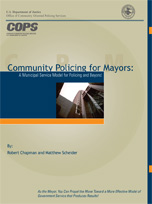 |
Community Policing for Mayors: A Municipal Service Model for Community Policing and Beyond Many local elected officials, managers, and community members ask if their agency is a community policing agency. While there are many definitions of community policing, this short guide provides some direction, discussing what community policing looks like in practice, how it integrates with traditional policing strategies, and how it relates to the broader government service model. Included are some tips for how elected officials can locally promote this model. |
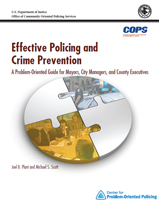 |
Effective Policing and Crime Prevention: A Problem-Oriented Guide... This guide can help local government executives understand how local government in general, and local police in particular, can more effectively meet the challenge of establishing public safety. It discusses general and specific approaches to crime and disorder and the local government executive’s role in policing and crime prevention. |
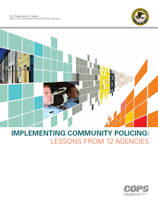 |
Implementing Community Policing: Lessons from 12 Agencies What does it mean when a police agency says it practices community policing? This report explores questions like this by describing and analyzing the experiences of local law enforcement agencies and lessons learned as they work to define, make sense of, and implement community policing. While there is no one-size-fits-all approach to implementing community policing, this report offers police officials at all levels ideas that can be used in their own organizations. |
 |
Innovations in Police Recruitment and Hiring— Hiring in the Spirit of Service This report shares how five sites that participated in a COPS Officefunded project, titled “Hiring in the Spirit of Service,” implemented significant change into existing hiring processes to recruit and select law enforcement officers that reflect a more service-oriented field. This publication discusses how each site progressed to meet its goals and describes the challenges encountered along the way as well as lessons learned. |
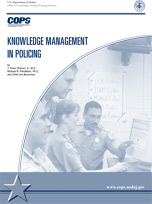 |
Knowledge Management in Policing Within three chapters, this publication introduces the concept of knowledge management in policing, documents and examines its use in a West Coast police department, and outlines a series of guidelines for adopting and implementing knowledge management as an organizational development and management strategy. |
![]()
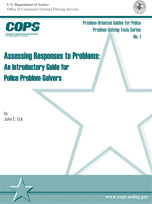 |
Assessing Responses to Problems: An Introductory Guide for Police-Problem Solvers This guide summarizes knowledge about information gathering and analysis techniques that might assist police at any of the four main stages of a problem-oriented project: scanning, analysis, response, and assessment. Extensive technical and scientific literature covers each technique. |
 |
Crime Analysis for Problem Solvers in 60 Small Steps Intended for crime analysts and other police officials, this manual covers the basics of problem-oriented policing and shows how many new concepts developed to analyze crime patterns can sharpen understanding of crime and disorder problems. It also shows how the 25 techniques of situational crime prevention can greatly expand the problem-solving capacity of police.. |
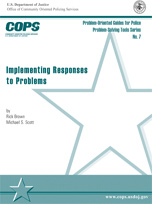 |
Implementing Responses to Problems This guide addresses why responses do or do not get properly implemented and offers suggestions to better ensure that they do. The guide is divided according to the four key stages of implementation: pre-implementation, which addresses factors to consider; planning, which covers implementation mechanics and systems; implementation, which focuses on putting in place, monitoring, and adjusting responses; and post-implementation learning, which discusses successes and failures. |
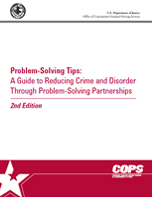 |
Problem-Solving Tips: A Guide to Reducing Crime and Disorder through Problem-Solving Partnerships This guide contains information and insights into the process of implementing a problem-solving approach. It takes the reader step by step through solving problems, offers examples from the field, and provides additional resources. |
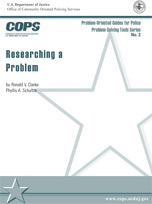 |
Researching a Problem This guide summarizes knowledge about information gathering and analysis techniques that might assist police at any of the four main stages of a problem-oriented project: scanning, analysis, response, and assessment. This tool helps users to define their problem, conduct Internet searches, get advice from experts, visit libraries, and evaluate their primary sources of information. |
For more information or to place an order, please call the COPS Office Response Center at 821.421.6770 or visit the Resource Information Center (RIC).


